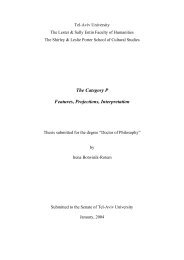Personalized Medicine “It doesn't get more personal than this.â€
Personalized Medicine “It doesn't get more personal than this.â€
Personalized Medicine “It doesn't get more personal than this.â€
Create successful ePaper yourself
Turn your PDF publications into a flip-book with our unique Google optimized e-Paper software.
interview<br />
18<br />
Some say that the Israeli-Palestinian<br />
conflict is as much about psychology<br />
as it is about territory. What are<br />
the most intractable psychological<br />
issues at play?<br />
Mutual recognition of each other’s<br />
national rights and collective identities.<br />
This is fundamental. It is a profound<br />
psychological process, as it challenges<br />
core beliefs in our historical narratives.<br />
For Israelis, it requires conceding part<br />
of what we consider our biblical homeland.<br />
It is dividing Jerusalem. And for<br />
the Palestinians, it’s relinquishing their<br />
claim to the majority of what they consider<br />
their homeland and the Right<br />
of Return. These are deeply painful<br />
internalizations for both sides, without<br />
which we cannot talk about peace and<br />
reconciliation.<br />
Surely <strong>this</strong> leads us to a dead-end?<br />
Not necessarily. Despite the present<br />
stalemate in negotiations, both sides<br />
have made tremendous progress in overcoming<br />
<strong>this</strong> obstacle to peace. A majority<br />
of Israelis accept the establishment<br />
of an independent Palestinian state – an<br />
unimaginable scenario a couple of decades<br />
ago. And a majority of Palestinians<br />
accept the Green Line as the basis for<br />
their own state. This is also a revolution<br />
in their collective psyche. We are<br />
finally moving beyond the negation<br />
of each other’s existence. However, a<br />
complete lack of trust between the two<br />
sides remains a major barrier.<br />
What about acknowledging each<br />
other’s pain?<br />
Israelis and Palestinians engage in<br />
“competitive victimhood,” denying each<br />
other’s suffering because they think that<br />
if they were to recognize their mutual<br />
pain, they will forfeit their legitimate<br />
national rights. But Israelis can recognize<br />
the Palestinian refugees’ trauma<br />
without <strong>this</strong> leading to a right of return<br />
to Israel proper. And the Palestinians<br />
can acknowledge the depth of Jewish<br />
historical tragedy without signing away<br />
their rights to a homeland. Ours is a gray<br />
conflict – we’re talking about 100 years<br />
of bloodshed, during which all sorts of<br />
actions were committed by both sides.<br />
The blame game needs to end.<br />
Why are Israelis so averse to<br />
accepting <strong>this</strong> proverbial “grayness”?<br />
A key impediment is a phenomenon<br />
that social psychologists call “siege mentality.”<br />
This national feeling of being<br />
under siege is not only a result of real<br />
experiences, including the Holocaust,<br />
but also of extremely powerful agents of<br />
socialization that maintain <strong>this</strong> world<br />
view. The speeches of our political leaders,<br />
articles in the press, school textbooks<br />
– almost every day I find some<br />
reference to siege mentality: “We are in<br />
a fight for our very existence, the whole<br />
world is against us” and the like. This<br />
siege mentality is learned, and makes<br />
the conflict intractable. It paints any<br />
concession, any acknowledgement of<br />
wrong-doing, as existentially jeopardizing<br />
the future of Israel.<br />
What can be done to instead nurture<br />
a “culture of peace” among a new<br />
generation of Israelis?<br />
My ten-year old daughter recently<br />
brought home a political map of Israel.<br />
There was no Green Line, even though<br />
Beyond<br />
the Realm of<br />
Impossibility<br />
Israel hasn’t annexed the West Bank.<br />
This teaches that all the land belongs to<br />
Israel, and nothing to the Palestinians.<br />
This is pro-conflict socialization on the<br />
most basic of levels. But if education<br />
is critical in sustaining the “ethos of<br />
conflict,” education can also promote<br />
peace. This will require changes in<br />
school curricula and revision of textbooks<br />
amongst other measures – to let<br />
go of our maximal aspirations, negation<br />
of the other, siege mentality and other<br />
negative worldviews.<br />
And what of the Palestinians? What<br />
steps do they need to take?<br />
They need to do exactly, absolutely<br />
the same as the Israelis. In education, in<br />
battling incitement, in recognizing the<br />
rights of Israelis to their own state, in<br />
ceasing to use violence to achieve their<br />
goals. For the Palestinians, I see the<br />
biggest psychological challenge being<br />
preparing their refugee population to<br />
accept that they will not be returning<br />
to Israel proper. Their leadership needs<br />
to declare <strong>this</strong> loudly, unequivocally,<br />
and in Arabic, so that expectations can<br />
be adjusted to reality. President Abbas<br />
has visited refugee camps in Lebanon<br />
and explicitly said <strong>this</strong> – an extremely<br />
encouraging development.

















